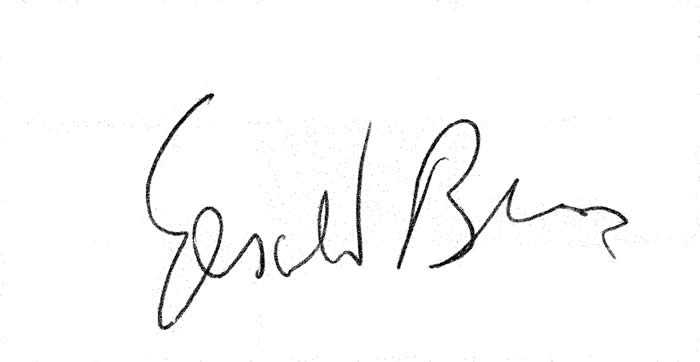
The pearl on the impresario's breastpin, says Brophy, expresses radiance with
broken rays; convention taken at the point of decay can be exciting, as Eliot
felt Marston tolerable, the virgules separating the five feet of his lines
gone to dots, notional, screened back to gray, Pallas's bust pallid
for more than the part-rhyme, more how a drawn line apes another,
the jewel in its ear no longer pearl, a different kind of contrast, say
Frank Gallup's third eye as he looks at you in his black turtleneck
over a candle in a winebottle, on a black and white screen, his head
as isolated as his eye, really a rhyme to his voice, Lights Out.
Dylan Thomas in his farm dreamed of hanged men, pendular verse
the opposite of metronomic. How does one revive a talent, tarnished thing?
Poe's writing desk with a raven wired to it would still be drab, cheapest wood
painted black, not solidest as Dickens's in Doughty Street, Tussaud's
but it's Poe dreaming not of characters but sentences that troubles me,
a narrative that forgets narrative, a rate inside themselves, enacted
as when mushrooms braised in fat hit my stomach, kick off a gallstone
attack and it feels like indigestion, event too immediate to be dignified
the pen trailing ink across the paper, like Pollock, gone to little dots,
fair copy dependent on the foul papers for its life and movement,
my poster for our Homage to the Beats Leuth wearing glasses, sleeves
pushed back, putting up her hair, one version lilac, one what they call canary.
You want the yellowbacked novel Van Gogh painted once to be on Zola's desk,
strontium Nana, as if pieces from quite different still-lifes and portraits could be joined
in one painting, a Homage to everyone, and this not camp but propriety, a neatness
like the ends of Whitman's lines, looking about, have I got everything in, am I done yet,
Rubens painting himself by some forgetfulness into a crowd scene, Dante meeting
William Wilson in hell and heaven, that back door into hell in Pilgrim's Progress silvered.
You could baffle an X-ray machine with a screen made of fine lead wires bent to be
proportional from a point of view, hide the secret drawer in Poe's desk, energy latent
in a bottle with a message in cork-down in sand, the notion of its motion
thrown into the sea prior to conjectures as to its intent. A blank page will do.
People who wear metal would have "hot pockets" flattishly rectangular to leave
each other messages typed on heavy aluminum foil, erased by the act of creasing them
to fit tin envelopes. Adjustable fingers hold Space Pens, spray their floors with glycerine.
Fantasy in the form of a list is like informing people. That you have. A list.
Beauty was this, a thin silver chain tacked three or more times
in a gracefully ascending curve, roughly equivalent parabolae,
result you could imagine of a local acceleration in inertial mechanics;
"solution" to a "problem" in, as it were, design, Eureka's appeal
to elegance a quality of sentences, in spite of an urgency of tone,
an earnestness defining itself as urgency, the Ancient Mariner's solution
to what he imagines as a problem of diction, how to use archaic
speech (later jettisoned) because one likes it, without pastiche.
So words scanned interrupt themselves to tell you things, buttonhole
the reader, "Playnyng in vain unto the mone" as Wyatt said,
insisting over and over that he "has done," in English of his period.
Anything set to ancient hendecasyllables is like moonscapes
deliberately flattening color toward monochrome, Bridges telling us
about the passions in passionless verse, impeccable
in his own ear, as full of useful statistics about Milton's prosodic
habits as he was of reservations about Gerard Hopkins's
verse in letters poured into the Jesuit's professionally humble ear,
nor do I mean (as Berryman would) to "side with" Hopkins here.
Copyright Gerald Burns 1995-1997